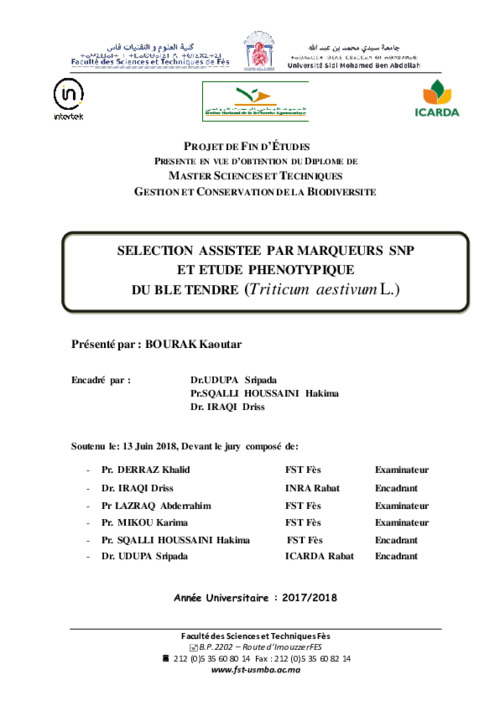Selection Assistee Par Marqueurs Snp Et Etude Phenotypique Du Ble Tendre (Triticum Aestivum L.)
Abstract
In varietal breeding programs for bred wheat (Triticum aestivum L.), it’s necessary to use Marker Assisted Selection for fast track improvement of this species against fungal diseases, specifically Rust (Yellow Rust, Leaf Rust and Stem Rust) and many other agronomically important traits. Our study is based on an F5 population from a cross of Kharoba and Florence varieties , sown at the ICARDA experimental station in Marchouch during the 2017/2018 farming season. In order to accelerate the creation of a semi dwarf, rust-resistant bread wheat variety marker-assisted selection (MAS) using SNP markers linked to ten genes of interest for bred wheat improvement, namely, rust resistance genes (Lr34, Sr2, Lr37 / Yr17 / Sr38, Lr68, Lr19/ Sr25, Lr67, Sr22 and Lr46) and semi-dwarf genes (Rht-B1b and Rht-D1b). To select bread wheat lines for key agro morphological traits necessary for adaptation under Moroccan rainf-ed growing conditions. various phenological parameters (precocity to heading, early flowering, early anthesis, early grain filling and early maturity), agronomic (tillering capacity and number of spikes per plant), in addition to morphological characteristics (plant height, ear length and beard length) were studied. The results obtained make it possible to select a large number of samples belonging to the F5 population, which gather the genes of interest and the desired phenotypic characters , thereby speedup varietal development process in bread wheat to cope with challenges pests and diseases and adaptation to climate change

